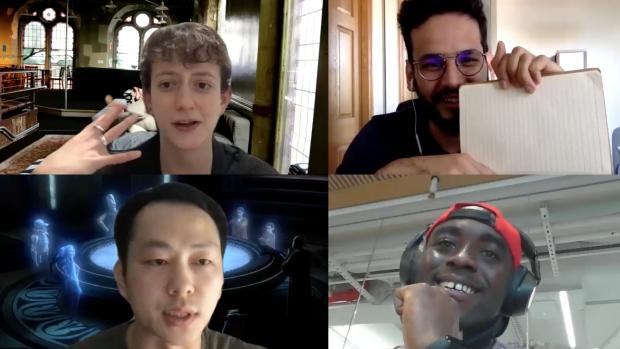Improv classes help grad students hone communications skills

Rima Dodd (top left) from the Irondale Ensemble Project walks graduate students through an acting exercise over Zoom. The class is aimed at improving the way engineers and researchers communicate their work to different audiences.
William Peng searches through the grid of faces on Zoom, looking for a classmate to ask the question. “Rodrigo,” he asks, “What do you do as a hobby.” Rodrigo mentions that he likes to draw. Peng thinks for a few seconds, and then begins to free associate. When you draw faces for example, the proper uses of lines and proportions can create an image that transmits emotion. And in a way, Peng studies the transmission of emotions — how they travel and who they reach.
Peng and his classmates are taking part in an exercise for their Science Writing and Communication class. In one minute or less, they have to describe their research using only words that relate to another classmate’s hobby.
The class is taught by Matteo Rini, an adjunct professor at NYU Tandon and editor of Physics from the American Physical Society. The course — consisting of 30 graduate students from across the engineering school — is aimed at helping students learn to communicate their research to others, whether it be experts in other fields, lay people, or anyone else who they might be speaking to. For students working on the cutting edge of technological innovation, it’s easier said than done.
“When we communicate science, we often deliberately depersonalize it,” said Rini. “In papers, proceedings and talks, scientists ‘hide’ themselves behind academic language. These improv exercises teach students that it's not a sin, but a value to show who they really are — their passion, their intelligence, their sense of humor. After two hours of workshop I usually know much more about each student's personality than after months of classes.”
For these sessions, Rini brought in a communication ringer: Terry Greiss, an actor and instructor from the Irondale Ensemble Project, a theatre company based in NYC. In addition to their productions, they work with outside groups — including at-risk youth, prisoners, and young scientists — to teach communication skills based on their experience as actors and producers. Greiss, a co-founder of the group and theater veteran of over 45 years, was joined by Rima Dodd, Director of Education at Irondale.
Together, they walked students through exercises that would seem to have fit better in an improv course than advanced scientific education. In the first part of the class, they are asked to pick other students or instructors and compliment them (or in another exercise, cheekily insult them) using a pre-established call-and-response. The round-robin loosens up the group, but also provides key insights in how to communicate even beyond the language they choose — the virtues of communicating physically, and gesturing, without becoming a caricature.
The hobby exercise, for example, isn’t just about the value of metaphor. It’s about making a human connection to the party the students will be communicating their science to.
“Finding common ground is critical,” Greiss told them during the Zoom class. “Don’t take yourself too seriously, and bring your message to the audience.”
Dodd added that even if you are used to speaking to people in your own field, and have honed your message to that audience, you need to be prepared to speak to an audience of people who aren’t experts in your domain. “You need to find ways to translate your work, and that takes practice.”
Rini’s class isn’t just acting seminars though. In addition to teaching the fundamentals of effective science communication, he brings in professional writers and communicators to give their perspective on how to get across the importance of their work. Rini believes that effective communication is the duty of scientists and engineers, who do work that can change society but don’t always know how to talk about it with non-experts.
“Being able to improvise is a great asset for public speaking; it helps a presenter react to an unexpected situation, deliver more spontaneous and lively talks; and it mitigates stage fright by teaching to welcome, rather than fear, the unexpected,” he said. “And through exercises like explaining one's research to a time traveler from the Middle Ages, students practice how to tailor their words to the person with whom they are communicating. Throughout their careers, they will meet scientists not working in their immediate field, funding agents, investors, HR people, journal editors, clients, journalists, and the general public — and they will be better equipped to recognize who these ‘time travellers’ are and how to talk to them.”




